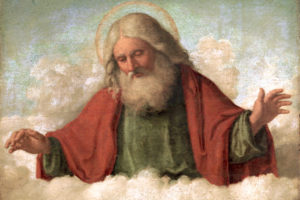Last edited on 25/Jan/2021
The Bible’s Answer
Introduction
The Bible’s answer to this question is that there is only one true, living God in all existence. This doctrine is known as monotheism, and it is an essential biblical doctrine. This does not mean that there are many gods that exist, but that only the God of the Bible is worthy of worship, nor does it mean that the God of the Bible is the only God of this world alone, and that there are other gods that rule other worlds, but rather it literally means that there is no god that exists except for the God of the Bible.
Attributes of the Only God
The only God in all existence is the cause of the universe’s existence and the author of all creation (Ps 33:6). He is sovereign (1Tim 6:15), all-powerful (Jb 42:2), all-knowing (1Jn 3:20), and all-present (Eph 4:6). He has never come into being at one point, because he is eternal, from everlasting to everlasting (Ps 90:2). He is the one who sustains all life and who is capable of ending all life (Heb 1:3). He is the Judge (Heb 12:23) and King (Jer 10:10) over all that he has made, and he has the final say in all things (Ps 33:11). The one and only true God is also a Trinity. This does not mean that there are three gods, but rather that God has revealed himself as one God in three distinct Persons (Mt 3:16–17), known as the Father (1Cor 1:3), Son (Jesus Christ) (Jn 20:28–29), and Holy Spirit (Ac 5:3–4).
Bible Passages
To you it was shown, that you might know that the LORD is God; there is no other besides him. (Deuteronomy 4:35, ESV)
Therefore you are great, O Sovereign LORD, for there is none like you. There is no God besides you! What we have heard is true. (2 Samuel 7:22, NET)
You are my witnesses,” declares the LORD, “and my servant whom I have chosen, that you may know and believe me and understand that I am he. Before me no god was formed, nor shall there be any after me. (Isaiah 43:10, ESV)
This is what the LORD says, He who is the King of Israel and his Redeemer, the LORD of armies: ‘I am the first and I am the last, And there is no God besides Me. … 8 Do not tremble and do not be afraid; Have I not long since announced it to you and declared it? And you are My witnesses. Is there any God besides Me, Or is there any other Rock? I know of none. (Isaiah 44:6, 8, NASB)
I am the LORD, and there is no other; apart from me there is no God. I will strengthen you, though you have not acknowledged me, … (Isaiah 45:5, NIV)
So then, about eating the food offered to idols: we know that an idol stands for something that does not really exist; we know that there is only the one God. 5 Even if there are so-called “gods,” whether in heaven or on earth, and even though there are many of these “gods” and “lords,” 6 yet there is for us only one God, the Father, who is the Creator of all things and for whom we live; and there is only one Lord, Jesus Christ, through whom all things were created and through whom we live. (1 Corinthians 8:4–6, GNT)
You believe that there is one God. You do well. Even the demons believe—and tremble! (James 2:19, NKJV)
Why Is Monotheism Important?
The simple reason why monotheism is so important is because the Bible clearly and explicitly teaches it. Everything that the Bible teaches is the truth, because it is God’s Word (2Tim 3:16), and God never lies (Ti 1:2). Both to acknowledge the existence of or worship other gods is to rebel against God, and also to believe in and worship idols which do not really exist (1Cor 8:4–6). This is the sin of idolatry, which God condemns (Lv 26:1).
The reason why God does not want us to commit idolatry is because he does not want us to waste our lives on worshipping or believing in so-called “gods” that are dead, and that do not exist. It is also because he does not want idols to divert our attention from him and to distort our true understanding of him. God wants everyone to be saved (1Tim 2:3–4) and to have a relationship with him (Col 1:19–20). This is not possible with someone who acknowledges the existence of or worships other gods. God commanded the prophet Jeremiah to say:
But the LORD is the true God; he is the living God and the everlasting King. At his wrath the earth quakes, and the nations cannot endure his indignation. (Jeremiah 10:10, ESV)
Unlike the so-called “gods” of other religions and faiths, the Lord is the true, living God. The fact that God is true and living means that he does not just live in the minds of Christians or the text of the Bible, but that he is truly alive and active in this universe that he created. The God who made heaven, earth, and all their host (Ne 9:6), who breathed life into us (Jb 33:4), who formed our inward parts and knitted us together in our mothers’ wombs (Ps 139:13–14), who is the giver of every good and perfect gift (Jas 1:17), and who sent his Son, Jesus Christ, to suffer and die for our sins on the cross (Rm 5:6–8), is most definitely worthy of our worship and praise.
Monotheism Is Necessary to Believe for Salvation
God highlights the absolute importance of monotheism in the First of the Ten Commandments:
You shall have no other gods before me. 4 “You shall not make for yourself a carved image, or any likeness of anything that is in heaven above, or that is in the earth beneath, or that is in the water under the earth. 5 You shall not bow down to them or serve them, for I the LORD your God am a jealous God, visiting the iniquity of the fathers on the children to the third and the fourth generation of those who hate me, 6 but showing steadfast love to thousands of those who love me and keep my commandments. (Exodus 20:3–6, ESV)
Here, the God of the Bible—who is the Father, Son, and Holy Spirit—declares that whoever denies that he is the only God in existence will have iniquity visited upon them. God declared it to be an essential doctrine. False gods and idols cannot help us, nor can they save us from our sins; only God can do that (Is 43:11; Ti 3:4–7).
God has given us this strict commandment to protect us from wandering astray from him and missing out on his blessings; to make known to us the kind of life he wants us to live; to keep us heading towards the narrow gate, the way that is hard, that leads to eternal life, and away from the wide gate, the easy way that leads to destruction (Mt 7:13–14). God gave us this commandment for our own good, and we can choose to either listen to and obey him, or we can wander away from his truth, and bring upon ourselves the consequences.
I urge, then, first of all, that petitions, prayers, intercession and thanksgiving be made for all people— 2 for kings and all those in authority, that we may live peaceful and quiet lives in all godliness and holiness. 3 This is good, and pleases God our Saviour, 4 who wants all people to be saved and to come to a knowledge of the truth. (1 Timothy 2:1–4, NIVUK)






